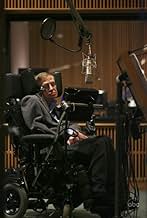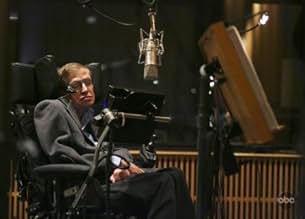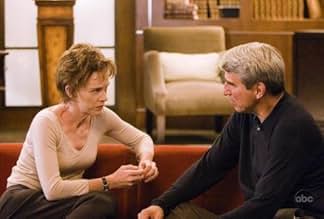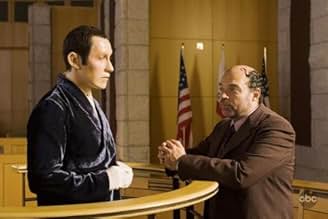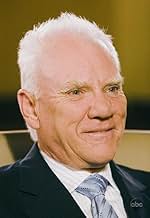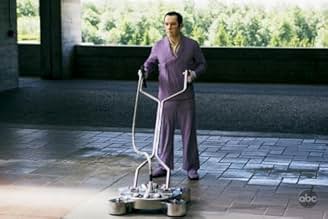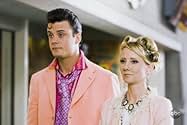Masters of Science Fiction
- टीवी सीरीज़
- 2007
- 42 मि
IMDb रेटिंग
6.7/10
2.3 हज़ार
आपकी रेटिंग
अपनी भाषा में प्लॉट जोड़ें"Masters of Science Fiction" was a 2007 hosted science fiction anthology series, hosted by Stephen Hawking."Masters of Science Fiction" was a 2007 hosted science fiction anthology series, hosted by Stephen Hawking."Masters of Science Fiction" was a 2007 hosted science fiction anthology series, hosted by Stephen Hawking.
- 1 प्राइमटाइम एमी के लिए नामांकित
- 2 कुल नामांकन
एपिसोड ब्राउज़ करें
फ़ीचर्ड समीक्षाएं
It's not different by much, except it's not nearly as good. The pre-show hype from ABC was that it was the best series since the TWILIGHT ZONE. They must have been writing that hyperbole with their heads in the Twilight Zone.
The narrator is Stephen Hawking, using his quasi-mechanical voice, but otherwise just like an Outer Limits episode. That isn't terrible in itself, but certainly not original.
The opening and titles sequences are modernized with fancy graphics, etc, otherwise they are similar. Narration ends with a warning or social observation, similar to Outer Limits, yet more heavy-handed.
The first episode shown was obviously the program's producers and writers attempt at topical political statement, and as such it was ham-fisted and preachy, and ludicrous as well, and about as topical as the Berlin wall. The recent Outer Limits series also had a political bent, yet was often more subtle and earnest in presentation.
This initial episode quickly became predictable, and ultimately boring, and showed a surprisingly limited range for actor Sam Waterston, who easily can be much better. Judy Davis was good here yet not nearly as good as she can be.
Don't believe the ABC promo baloney, and remind yourself that this is the same network that trashed Kolchak:The Night Stalker with that loser remake of a fine series.
Episode 2: Viewing of the second episode ultimately left the same impression as the first. While initially promising, and a much better use of actors and a wider, a more involved setting, this episode succumbed to the same preachy, heavy-handed political dogma that marred the first one. In fact, this episode was less subtle, more absurd and more strident in it's denouncement of US policy, as well as naive and unrealistic about other nations' motives. (My more detailed commentary is available under the specific episode title, and those who wish to vote negatively for political reasons should do so there)
Episode 3: A social statement of intrinsic value, yet not truly interesting nor captivating. Did not dislike it, but did not find that it really captured effectively the modern pop-culture mentality it mocked. The same material has been handled better in other series, but of episodes 1, 2 and 3, this one had more worthiness. Unfortunately, a great Twilight Zone was being shown on another channel about a man who is becoming "nobody" to all around him, and that amplified the weaknesses of this series.
Episode 4: The best of the four episodes takes the series to 'where it has not been before', meaning a decent and above average effort. Maintains the emphasis on commentary, this time it is more social than political, and is much less strident and dogmatic, and hence plays well. This rather thoughtful and well-acted episode causes me to raise my overall vote by two points. The only problem is that the ending is rather vague, and could have been more distinct, but it's a satisfactory episode regardless. The best was saved for last.
The narrator is Stephen Hawking, using his quasi-mechanical voice, but otherwise just like an Outer Limits episode. That isn't terrible in itself, but certainly not original.
The opening and titles sequences are modernized with fancy graphics, etc, otherwise they are similar. Narration ends with a warning or social observation, similar to Outer Limits, yet more heavy-handed.
The first episode shown was obviously the program's producers and writers attempt at topical political statement, and as such it was ham-fisted and preachy, and ludicrous as well, and about as topical as the Berlin wall. The recent Outer Limits series also had a political bent, yet was often more subtle and earnest in presentation.
This initial episode quickly became predictable, and ultimately boring, and showed a surprisingly limited range for actor Sam Waterston, who easily can be much better. Judy Davis was good here yet not nearly as good as she can be.
Don't believe the ABC promo baloney, and remind yourself that this is the same network that trashed Kolchak:The Night Stalker with that loser remake of a fine series.
Episode 2: Viewing of the second episode ultimately left the same impression as the first. While initially promising, and a much better use of actors and a wider, a more involved setting, this episode succumbed to the same preachy, heavy-handed political dogma that marred the first one. In fact, this episode was less subtle, more absurd and more strident in it's denouncement of US policy, as well as naive and unrealistic about other nations' motives. (My more detailed commentary is available under the specific episode title, and those who wish to vote negatively for political reasons should do so there)
Episode 3: A social statement of intrinsic value, yet not truly interesting nor captivating. Did not dislike it, but did not find that it really captured effectively the modern pop-culture mentality it mocked. The same material has been handled better in other series, but of episodes 1, 2 and 3, this one had more worthiness. Unfortunately, a great Twilight Zone was being shown on another channel about a man who is becoming "nobody" to all around him, and that amplified the weaknesses of this series.
Episode 4: The best of the four episodes takes the series to 'where it has not been before', meaning a decent and above average effort. Maintains the emphasis on commentary, this time it is more social than political, and is much less strident and dogmatic, and hence plays well. This rather thoughtful and well-acted episode causes me to raise my overall vote by two points. The only problem is that the ending is rather vague, and could have been more distinct, but it's a satisfactory episode regardless. The best was saved for last.
"From the very beginning, we have wondered how life began, what our purpose is and where we are headed. We have struggled to understand time, matter, the infinite universe, who we are and if we are alone. Great minds have come up with the most wonderful and the most terrifying answers. We invite you to join us on this great journey!" This opening narration by Stephen Hawking is not exactly accurate, because all of the six episodes attempt to answer only one question, and that is where we are headed. The answer is usually the same: Society and Technology will cause the downfall of humans, machines will take over the Earth and the people will annihilate themselves with nuclear weapons. Whatever the case, the next 100-200 years won't be pleasant, according to the Masters.
Masters of Science Fiction gets its title from the authors of the Stories, the episodes are based on. Robert Heinlein, author of the great Sci Fi novel "Stranger in a Strange Land" is represented, as well as John Kessel, Howard Fast, Walter Mosley, Harlan Ellison and Robert Sheckley. The truth is, the ideas of the episodes are always extremely good. Creativity and Originality can be found in all of the six episodes, but while some have very interesting plots, others are quite dull, and lack exciting scenes and dialog.
Even though, the series features some great actors, most of them are terribly underused. Sam Waterston, Terry O'Quinn and John Hurt are the only ones, who get to use their talent in a large number of scenes, while Judy Davis, James Cromwell, Brian Dennehey, Sean Astin and especially Malcolm McDowell shine in the scenes they have, but often make very short or badly written appearances.
Now as far as the individual episodes are concerned, I will go from the worst to best. By far the biggest disappointment was "Watchbird", especially because it had great potential due to the actors (Sean Astin and James Cromwell) and some good ideas (computer birds, who are programmed to attack anyone with the intentions to kill someone). But the whole plot just drags along and the end does not satisfy the viewer.
"Little Brother" is not exactly bad, but in my opinion horribly written. To have computers as the judges in the future índeed was a great idea, but like Watchbird, a lot of potential was wasted, due to overlong scenes. Clifton Collins, Jr. acts quite well given the terrible script.
"The Awakening" now can actually be called good. The writing was all right and Terry O'Quinn once again proves what a wonderful actor he is. But the political message was just a little too extreme, that all countries are willing to lay down their arms, except the United States. That might actually reflect reality to a certain extent, but this was definitely exaggerated.
Now, as for "The Discarded", that episode was quite a treat. John Hurt is perfectly cast in his role, on a ship full of disfigured people, who are suffering from RIGGUM. The message might seems a little extreme, but we do live in a society, where people do everything to be perfect and I don't think this future is too far fetched. The only flaw of the episodes is once again, that some scenes are a little dull.
Heinlein's "Jerry was a Man" starrs a great Malcolm McDowell and Anne Heche, who plays the seventh richest woman in the world. When she finds out that Tibur Cargrew and his company create humanoids, with a limited brain capacity, to do dangerous or unpleasant jobs, she feels sorry for them and even adopts one of them. A fierce legal battle erupts, as to whether Jerry, a humanoid, has feelings and should be considered a man.
Last, but certainly not least "A Clean Escape" is in my opinion the highlight of the series. A woman, interrogating a man in a room might not sound too interesting at first but the shocking ending and the great acting by Judy Davis and especially Sam Waterston make this episode entertaining, gripping and does not leave us cold after the ending.
In conclusion, I do recommend the series to people who like Science Fiction, but I would rent the DVD. True, the episodes are not everyone's taste and some of them are quite mediocre.
Masters of Science Fiction gets its title from the authors of the Stories, the episodes are based on. Robert Heinlein, author of the great Sci Fi novel "Stranger in a Strange Land" is represented, as well as John Kessel, Howard Fast, Walter Mosley, Harlan Ellison and Robert Sheckley. The truth is, the ideas of the episodes are always extremely good. Creativity and Originality can be found in all of the six episodes, but while some have very interesting plots, others are quite dull, and lack exciting scenes and dialog.
Even though, the series features some great actors, most of them are terribly underused. Sam Waterston, Terry O'Quinn and John Hurt are the only ones, who get to use their talent in a large number of scenes, while Judy Davis, James Cromwell, Brian Dennehey, Sean Astin and especially Malcolm McDowell shine in the scenes they have, but often make very short or badly written appearances.
Now as far as the individual episodes are concerned, I will go from the worst to best. By far the biggest disappointment was "Watchbird", especially because it had great potential due to the actors (Sean Astin and James Cromwell) and some good ideas (computer birds, who are programmed to attack anyone with the intentions to kill someone). But the whole plot just drags along and the end does not satisfy the viewer.
"Little Brother" is not exactly bad, but in my opinion horribly written. To have computers as the judges in the future índeed was a great idea, but like Watchbird, a lot of potential was wasted, due to overlong scenes. Clifton Collins, Jr. acts quite well given the terrible script.
"The Awakening" now can actually be called good. The writing was all right and Terry O'Quinn once again proves what a wonderful actor he is. But the political message was just a little too extreme, that all countries are willing to lay down their arms, except the United States. That might actually reflect reality to a certain extent, but this was definitely exaggerated.
Now, as for "The Discarded", that episode was quite a treat. John Hurt is perfectly cast in his role, on a ship full of disfigured people, who are suffering from RIGGUM. The message might seems a little extreme, but we do live in a society, where people do everything to be perfect and I don't think this future is too far fetched. The only flaw of the episodes is once again, that some scenes are a little dull.
Heinlein's "Jerry was a Man" starrs a great Malcolm McDowell and Anne Heche, who plays the seventh richest woman in the world. When she finds out that Tibur Cargrew and his company create humanoids, with a limited brain capacity, to do dangerous or unpleasant jobs, she feels sorry for them and even adopts one of them. A fierce legal battle erupts, as to whether Jerry, a humanoid, has feelings and should be considered a man.
Last, but certainly not least "A Clean Escape" is in my opinion the highlight of the series. A woman, interrogating a man in a room might not sound too interesting at first but the shocking ending and the great acting by Judy Davis and especially Sam Waterston make this episode entertaining, gripping and does not leave us cold after the ending.
In conclusion, I do recommend the series to people who like Science Fiction, but I would rent the DVD. True, the episodes are not everyone's taste and some of them are quite mediocre.
Masters of Science Fiction, now showing on ABC, takes short stories from award-winning Sci-Fi authors and adapts them into hour-long television episodes. It advertises itself as a successor to The Twilight Zone.
Twilight Zone and Outer Limits, in their day, had a similar format, but I'm not sure how devoted they were to using pre-existing material. It seems to me that many of the episodes for TZ or OL were written _for_ the show rather than _before_ the show. Herein lies what may be the problem for this series: Adaptation. Think of the problems people have when their favorite novels get turned into horrid screenplays, and make those problems TV-sized.
I happen to actually know the author of the first episode's short story (John Kessel, one of my professors), and I have not had a chance to hear his take on it. But from someone who is familiar with his writing style (although I had not read this particular story), I can say honestly that I saw traces of Kessel's style here. I imagine that the story he wrote was quite good; after all, the _story_ of the first episode was quite good.
But the lens of adaptation botched it for me. Acting was heavy-handed. Background music was over-dramatic and annoying. The teleplay made the "BIG SECRET" try and shock the audience, rather than letting the truths of the setting become a course of discovery.
On a side note, as much as Stephen Hawking is a genius, he would be a much more comprehensible narrator if his narration were subtitled. He is an appropriate choice, but his mechatronic voice is terribly difficult to understand.
If my fellow commenters happen to view this episode again, I would encourage them to not see it in a political lens. I don't want to give away any spoilers, but what is shown in "A Clean Escape" is not a Liberal/Conservative issue, but a Moral one. Don't assume that this is some ABC Liberal propaganda or nonsense of that kind.
I reserve some hope for the rest of this series. The first episode disappointed me, but ABC can make excellent shows. They can also make terrible shows.
6/10
Twilight Zone and Outer Limits, in their day, had a similar format, but I'm not sure how devoted they were to using pre-existing material. It seems to me that many of the episodes for TZ or OL were written _for_ the show rather than _before_ the show. Herein lies what may be the problem for this series: Adaptation. Think of the problems people have when their favorite novels get turned into horrid screenplays, and make those problems TV-sized.
I happen to actually know the author of the first episode's short story (John Kessel, one of my professors), and I have not had a chance to hear his take on it. But from someone who is familiar with his writing style (although I had not read this particular story), I can say honestly that I saw traces of Kessel's style here. I imagine that the story he wrote was quite good; after all, the _story_ of the first episode was quite good.
But the lens of adaptation botched it for me. Acting was heavy-handed. Background music was over-dramatic and annoying. The teleplay made the "BIG SECRET" try and shock the audience, rather than letting the truths of the setting become a course of discovery.
On a side note, as much as Stephen Hawking is a genius, he would be a much more comprehensible narrator if his narration were subtitled. He is an appropriate choice, but his mechatronic voice is terribly difficult to understand.
If my fellow commenters happen to view this episode again, I would encourage them to not see it in a political lens. I don't want to give away any spoilers, but what is shown in "A Clean Escape" is not a Liberal/Conservative issue, but a Moral one. Don't assume that this is some ABC Liberal propaganda or nonsense of that kind.
I reserve some hope for the rest of this series. The first episode disappointed me, but ABC can make excellent shows. They can also make terrible shows.
6/10
Decent show, seems to be adapted from good stories not that well, and mostly doesn't use the talent as much as they could. TV levels of photography, editing, and really pretty mediocre effects.
IMPORTANT: Note that almost all the negative reviews are weirdly politically motivated. Somehow they say that any morality is anti-american, anti-religion, etc. I don't get how after watching all the episodes, but if you are a type who has ever typed "hollyweird" un-ironically, don't watch this as you'll apparently be offended.
IMPORTANT: Note that almost all the negative reviews are weirdly politically motivated. Somehow they say that any morality is anti-american, anti-religion, etc. I don't get how after watching all the episodes, but if you are a type who has ever typed "hollyweird" un-ironically, don't watch this as you'll apparently be offended.
There is a reason why 'Masters of Science Fiction' didn't last a full season when first trotted out on ABC.
There's nothing in the collection of short stories badly translated to television that the original 'Outer Limits' and scant few Sci-Fi oriented episodes of 'Twilight Zone' from the 1960s didn't deliver with infinitely better precision.
'Masters of Science Fiction' more closely resembled the consistently bleak and down beat, over all inferior episodes of the re-vamped 1995 'Outer Limits'.
Though 'Masters of Science Fiction' no doubt boasts better talent and larger budgets. The screen writers, directors and cast should remember that when trying to deliver a 'message'. The subtlety of a feather works far more favorably than bludgeoning with a brick!
There's nothing in the collection of short stories badly translated to television that the original 'Outer Limits' and scant few Sci-Fi oriented episodes of 'Twilight Zone' from the 1960s didn't deliver with infinitely better precision.
'Masters of Science Fiction' more closely resembled the consistently bleak and down beat, over all inferior episodes of the re-vamped 1995 'Outer Limits'.
Though 'Masters of Science Fiction' no doubt boasts better talent and larger budgets. The screen writers, directors and cast should remember that when trying to deliver a 'message'. The subtlety of a feather works far more favorably than bludgeoning with a brick!
क्या आपको पता है
- कनेक्शनSpin-off from Masters of Horror (2005)
टॉप पसंद
रेटिंग देने के लिए साइन-इन करें और वैयक्तिकृत सुझावों के लिए वॉचलिस्ट करें
- How many seasons does Masters of Science Fiction have?Alexa द्वारा संचालित
विवरण
- रिलीज़ की तारीख़
- कंट्री ऑफ़ ओरिजिन
- आधिकारिक साइट
- भाषा
- इस रूप में भी जाना जाता है
- Stephen Hawking's Sci Fi Masters
- फ़िल्माने की जगहें
- उत्पादन कंपनियां
- IMDbPro पर और कंपनी क्रेडिट देखें
इस पेज में योगदान दें
किसी बदलाव का सुझाव दें या अनुपलब्ध कॉन्टेंट जोड़ें



